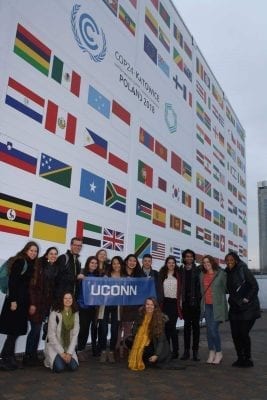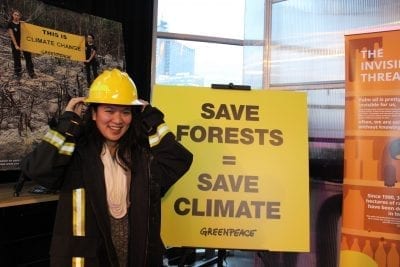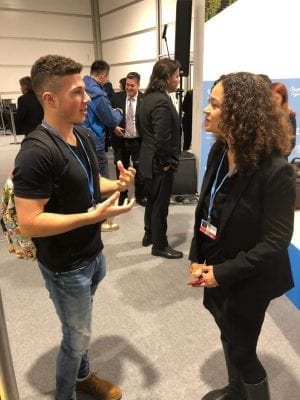Editor’s Note: During the conference, some of our fellows found themselves overwhelmed by climate change. But despite the feeling of hopelessness, countries have banded together to mitigate the problem. This worldwide cooperation inspires hope for the future and has acted as a source of empowerment for many of our COP fellows. The following blogs detail the emotional journey that many of our fellows experienced.
Finding the Good Among the Bad – Kat Konon
Hypocrisy and Hope at COP24 – Adrienne Nguyen
Out of Frustration Arises Empowerment – Jon Ursillo
A Blog About Blog Writing for COP24 – Sophie MacDonald
Finding the Good Among the Bad
Kat Konon – Junior, B.S. Chemical Engineering

The UConn@COP program takes students like me to the UN’s annual Climate Summit and Conference of the Parties (COP) with the expectation that we’ll share our experiences with others in the UConn community and beyond. It’s great for us fellows to have witnessed the conference in action, but we magnify the value of our participation in the COP by communicating what we experienced with as many people as possible upon returning home.
I wanted to come home with some motivational and insightful comments about what we can do to slow down climate change. I took notes and intended to distill one week of meetings, speeches, and demonstrations into just the highlights. When it comes to climate change, we have to emphasize the good or else we risk being overwhelmed by all of the bad news.
Unfortunately, I unintentionally ended up sharing too many lowlights. These were some of the harsh realities I learned about the effects of climate change and a few of the ironies I observed about where COP24 was being held and how it was being run. I didn’t even realize how negative my recap of the trip had been until my friend, who was beside me more often than not when I shared my COP experience with others, decided to field the “So, how was Poland?” question for me. Her summary went something like this:
“It was depressing! They started off with a trip to Auschwitz which sparked a conversation about climate genocide. With that on her mind, Kat then listened to indigenous peoples at the COP talk about how climate change is ruining their lives. Umm… usually she starts crying right about now. Anyway, she was really interested in the renewable energy initiatives, but those were undermined by the coal fired power plants she saw outside the venue every day (Poland’s electricity generation is 80% coal-based). Not to mention that the conference itself was co-sponsored by coal companies. Also, she was excited by a talk on plant-based diets but one of those speakers pointed out that many of the conference meals were unsustainable because of the high meat content. So, it’s ironic that people at the conference were calling for change but they’re not even serving more sustainable food, which is an effective way to reduce your personal carbon footprint! And so now she feels really guilty but also so lucky to be an American.”
After re-evaluating how I communicated about my experience with friends, I realized that there were also several parts of COP24 that gave me hope.
Greta Thunberg, a 15-year-old activist from Sweden, is inspiring young people to speak up. Every Friday, she skips school to protest outside of the Swedish Parliament. Her initial goal was for Sweden to reduce its emissions to be in line with the Paris Agreement, but COP24 gave her a platform to call for global action to limit the planet’s warming.
NGOs were well-represented, which stresses the idea we don’t have to rely solely on our national governments to implement change. Groups interested in energy, human rights, religion, law, rainforest preservation, and much more, championed their causes. Interacting with representatives from all of these different NGOs showed me that if you’re passionate about something, there’s a way to link it to the environment. Climate change is everyone’s problem.
During the last panel I attended, a speaker asked, “If we can’t change small things, how will we change big things?” That was a perfect note to end on because, on the way home, we reflected on the conference and talked about how UConn is still committed to achieving aggressive climate goals for the campus, despite the U.S. pulling out of the Paris Climate Agreement. The University aims to be a carbon neutral campus by 2050, and factors such as energy efficiency projects and LEED-certified buildings are helping us stay on track for our 2020 interim goal of a 20% reduction in carbon emissions from a 2007 baseline. We aren’t sustainable yet, but we are a leader among college campuses and I am so proud to be part of that.
Hypocrisy and Hope at COP24
Adrienne Nguyen – Junior, B.S. Pathobiology and Molecular and Cell Biology 
I would describe my experience at COP24 in three words: insightful, frustrating, and hopeful.
I was able to attend the plenary session for the Talanoa Dialogue which had representatives from all of the countries, providing their remarks in support for the new platform. Across all of the 2-5 minute statements, every country stressed that the IPCC 1.5˚ report must be at the heart of these discussions because of its emphasis on the need for urgent and ambitious action. The underlying message was that we had enough discussions three years after the Paris Agreement. It is time to commit to action because we’re on a catastrophic trajectory towards a global warming of 3.0˚C.
While our UConn cohort was only present during the first week of COP, as the policy making decisions happened the following week, I left the conference feeling frustrated. COP’s events schedule was filled with panels discussing critical issues such as the intersection of gender, feminism, poverty, and climate change and bringing in representatives from indigenous populations to speak. However, these events were only considered “side events”. It seems odd that even though COP24’s theme was to promote storytelling, these voices were not a part of formal negotiations. On one of the bus rides, I met a Portuguese conference attendee who said that Poland heightened its security in preparation for the conference and subjected all protestors to jail if they started any unapproved riots.
Poland’s law basically negates the meaning of the Talanoa Dialogue. At one of our pre-trip meetings back at UConn, we watched a video of protestors disrupting Trump’s “Coal for Climate” meeting at COP23. But COP24 didn’t allow for these diverse and plural voices to be heard. In fact, the Young Feminist for Climate Justice group had to get permission to host and schedule a march during the conference. How are we supposed to make change if the conference is censoring protests? This essentially creates yet another barrier for the voices of activists and non-governmental organizations to actually be included in climate negotiations.
The headlines that I have read about the results of COP24 focus on the “insufficient action” and “morally unacceptable” outcomes which were “totally inadequate.” The guidelines didn’t propose any immediate action towards getting on a low-carbon pathway by 2020.

I’m unsatisfied with the outcome of COP24 but I haven’t lost hope.
I met someone at the Climate Hub, who was a member of the Conference of Youth, and we discussed the US’s recent political climate. When I told him how dismayed I am about how rapidly our country’s politics are regressing, he mentioned that it is almost better to have the person in our current administration because it sparked a surge of diverse voices who want to spearhead change. This is analogous to COP24’s outcomes and the fight for climate change. The lack of action only lights the fire for young climate activists to hold the government accountable for avoiding a climate catastrophe. Greta Thunberg, the feisty 15 year-old Swedish climate activist, sure is not going to stop calling out political leaders for failing to make climate change higher on their agenda. People are not going to stop telling their stories but rather they’ll just raise their voices.
In the words of the Fiji Climate Champion for COP23, Minister Inia Seruiratu, “Are we like the people dancing on the titanic while the ship was sinking? We should not be so patient.” At COP24, I learned that we can no longer leave climate change in the hands of the government. It’s everyone’s responsibility to start demanding and taking ambitious action.
Out of Frustration Arises Empowerment
Jon Ursillo – Junior, B.S. Environmental Science and Economics
 COP24 yielded immense frustration with the status of global climate action. The current course of climate change mitigation, if continued, is on pace to put the 2 degree Celsius warming goal from Paris out of reach by 2030. The United States conducted a side event promoting coal and other fossil fuels and also partnered with Russia, Saudi Arabia, and Kuwait to blunt the acceptance of the alarming new IPCC report, detailing action required to prevent 1.5 degrees Celsius of warming. Hindou Oumarou Ibrahim, coordinator of the Association of Native Peul Women of Chad, pleaded for climate action on behalf of her people’s lives, but was given few tangible results. The host venue offered a meat-laden dining menu and lined its walls with plastic cups and jugs of water, juxtaposing the purpose of the conference with blatantly unsustainable practices.
COP24 yielded immense frustration with the status of global climate action. The current course of climate change mitigation, if continued, is on pace to put the 2 degree Celsius warming goal from Paris out of reach by 2030. The United States conducted a side event promoting coal and other fossil fuels and also partnered with Russia, Saudi Arabia, and Kuwait to blunt the acceptance of the alarming new IPCC report, detailing action required to prevent 1.5 degrees Celsius of warming. Hindou Oumarou Ibrahim, coordinator of the Association of Native Peul Women of Chad, pleaded for climate action on behalf of her people’s lives, but was given few tangible results. The host venue offered a meat-laden dining menu and lined its walls with plastic cups and jugs of water, juxtaposing the purpose of the conference with blatantly unsustainable practices.
Despite the exhaustive list of reasons for despair, I left the COP24 hopeful and empowered. In the midst of uncertainty regarding U.S. climate action, Joseph Robertson, Global Strategy Director for Citizens’ Climate Lobby, highlighted bipartisan support for a new carbon dividend bill, which would put a price on carbon in the United States and return 100 percent of the money back to the American people. Moreover, I witnessed Germany pledge 1.5 billion Euros to finance climate action across the world, particularly assisting developing nations adapt to a changing climate that they largely had no hand in changing. Additionally, I received powerful encouragement from Dr. Maria Neira, Director of Public Health, Environmental Health, and Social Determinants of Health for the World Health Organization, who implored Sahil Laul, another UConn student at COP24, and me to “Remember that you are politicians…you are politicians with a big P.”
Above all, perhaps the most inspiring aspect of my experience was engaging with the other UConn students on the trip. The passion, knowledge, and diverse perspectives that each student expressed were remarkable. I sincerely believe that I learned more from my peers during the week at COP24 than I have learned in all of my classes combined this past semester. Not only was I enlightened, but I was also injected with renewed hope and purpose that other students shared my desire for action. Further, the caliber of students from the UConn contingent gave me trust that the fight for the future of humanity will relentlessly persist. I am confident that the UConn students who attended COP24 will actualize Greta Thunberg’s vision for the world’s youth. The 15 year-old climate activist from Sweden spoke for all of us when she asserted, “We have come here to let you know that change is coming, whether you like it or not. The real power belongs to the people.”
A Blog About Blog Writing for COP24
Sophie MacDonald – Junior, B.S. Mechanical Engineering
I am Overwhelmed. This post was meant to be more positive, and maybe instill a sense of hope while discussing a less-than-cheerful topic. I will get around to that bit in the end, as my experience at COP24 was immensely valuable. For now, though, let me just say: I have struggled to write this blog. Learning about, writing about, discussing the complexities of climate change, is HARD. It is MENTALLY TAXING. There are so many reasons why. In fact, that’s actually one reason right there: it really isn’t just one topic.
Climate change encompasses so many issues and movements that I’m finding it impossible to talk about all of it accurately and concisely (in 500 words or less, a guideline you will notice I’ve greatly exceeded). I don’t want to misrepresent any of the science or the social movements involved, because skepticism surrounding climate change is so easy to feed by accident. Even if you explain a given facet of the issue perfectly, there are still a lot of people who will not believe the data presented, or will refuse to buy into the importance of environmental justice. Any imperfection in your presentation can severely damage credibility in this field where no one wants to believe that what you are saying is real in the first place. The goal is to involve as many people as possible in the conversation, so getting the facts straight and delivering the message well is crucial.
In order to further this goal, it is also important to be empathetic to the widest possible audience. This is not easy to do in when discussing such a charged topic. There is plenty of blame to be placed, and it is difficult to talk about climate change without feeling anger. This is not to say that we shouldn’t be angry; we absolutely should be. However, I and others in my generation have a tendency to create a narrative around blaming older people for the mess we seem to be in now, and I don’t know that focusing on this is the best way to get support for the environmental movement. Also, while industrial growth over time and its negative effects on the environment and its people are certainly as a result of those who came before us, I can’t fairly say that I would have acted differently in their position. Up until somewhat recently, few members of the general public could readily access the scientific research being done. Even if they could, it was easier in previous decades, for a variety of reasons, to perceive its ramifications as a distant problem with plenty of room for doubt. Of course, when we generation-blame, the anger is often truly directed at past policy-makers, not the general public. However, this point isn’t always made clear amidst the passionate speech-making – which is understandable, given that the nit-picking and caveat-creating I am doing now aren’t exactly conducive to a stirring call to action – and I have older adults in my life who have taken offense to this sort of dialogue and are more prone to discredit the ideas being shared because of it.
Generational tensions are just one example of the difficulty in finding common ground in this movement. There are so many ways to shut down a conversation about climate change, something few want to discuss in the first place, by inadvertently alienating someone based on some part of their identity. Of course, such identities can also be used to one’s advantage. We talked a lot amongst the students at COP about being able to relate climate change to people’s personal lives in order to really get them to care. This seems like a promising route to take, and directly rooted in the empathy I believe is so vital to all of this. It does become somewhat difficult to employ, though, when dealing with comparatively wealthy New Englanders, for instance, who aren’t yet seeing direct consequences in their immediate lives. It is much simpler to ignore problems when they aren’t at your own doorstep.
ANYWAYS, as you can see, I circle in my head over and over again when thinking about climate change and how to convey its effects to others. There are so many ways to get discouraged, and so many rabbit holes to fall down.*
So, I have thought a lot, and more thinking can always be done. Eventually, though, I do need to get to the point and act on my thinking. This is much easier said than done. A common theme throughout the environmental movement, and at COP24 specifically, is the hemming and hawing: ‘We must carefully think it all through and make sure steps are taken in the proper order!’ So the conversation goes. However, as Daniela Jacob, chapter lead author of the latest IPCC report, emphasized as a panelist for the COP24 event “From Science to Policy,” this has been the dialogue surrounding climate change for 30 years – we have thought about it plenty. Even now, this thinking and discussing is being used as a stalling tactic and is perpetuating the “political war” that is standing in the way of true progress.
The future now is clearer than ever. At this point, science pretty clearly demonstrates that
- Climate change is happening
- Increased carbon dioxide levels in the atmosphere are a significant contributor
- Humans are a major source of this increase, and
- This process is bad, for us and for the rest of the living planet. (Check out a previous OEP blog for a nice summary of the impacts).
The time to act is now, and there are many ways for individuals to help. The ones I will talk about next are rather aimed at college students, since such guidance is what I was looking to get for myself out of COP. One specific action to take if you plan to go directly into scientific research is to browse through the sections in the IPCC report titled “Knowledge Gaps and Key Uncertainties” at the end of each chapter. Here, the report includes topics and questions that require further research, some pertaining to atmospheric data, others to the social and political components, and still others to the economic aspects of climate change. I learned about these sections of the report at the previously mentioned “From Science to Policy” panel and was super excited, as this is exactly the detailed plan of attack that I had been looking for upon which to potentially base my own future career. In terms of furthering the movement more generally, and perhaps on a larger scale, there is always the option of taking the knowledge gained from the IPCC and other sources directly to policymakers. One way to do this as a student is by supporting or acting in environmental lobbyist groups. To quote another panelist, Jean-Pascal van Ypersele, “most leaders are not leaders, they are followers.” The onus is on our leaders to enact policies and generally act on behalf of our future, but realistically we must show them why they should act: we will not support them and they will be out of a job if they don’t.
Despite my constant internal grappling with all of this – now externalized at the start of this blog! – attending COP24 gave me some hope. There are people out there in positions of power who truly care. Whether enough people are doing enough caring to fix the problem before it is Too Late ™ remains to be seen. However, we have more knowledge and more clarity in purpose than ever before. With our ever-growing scientific knowledge, technological capability and awareness of the social and political effects of climate change, my generation has the potential to do incredible things. Ideally, we will choose to act on that capacity, and humanity will be better for it.
*(read NYT’s Losing Earth: The Decade We Almost Stopped Climate Change if you want to fall with me! Parts of it are overdramatized, but it’s a good overview of the U.S. debate on climate change and on how it became a debate in the first place. The article also touches on the fact that climate science has over a century of scientific backing.)